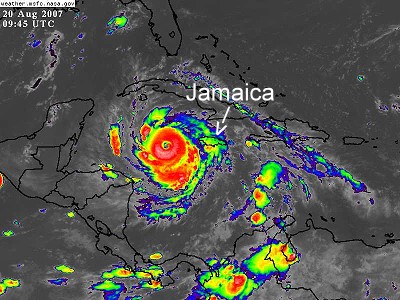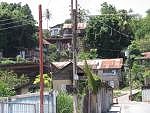UPDATE: August 20, 2007 – 8:35 AM

Hurricane Dean lashes Jamaica
KINGSTON, JAMAICA: Hurricane Dean pummelled Jamaica with gusting winds and torrential rains yesterday after the prime minister made a last minute plea for residents to abandon their homes and head for shelter. Many residents ignored the call, however, while tourists holed up in resorts with hurricane-proof walls.
Hurricane Dean Heads to Yucatan After Hitting Jamaica
The Cayman Islands may be spared Hurricane Dean’s 150 mile-per-hour winds as the storm heads toward Mexico’s Yucatan Peninsula after battering Jamaica.
Jamaica devastated by Hurricane Dean
Residents in Jamaica were today faced with the devastation caused by Hurricane Dean.
Dean batters Jamaica but worst ‘still to come
Jamaica received a severe battering from the first hurricane of the Atlantic season but appeared to have escaped the worst after Hurricane Dean whipped past the island’s southern coast overnight.
The storm hit Kingston, the Jamaican capital, with winds of up to 150mph, downing power lines, ripping off roofs and blocking roads with debris before spiralling off into the Caribbean in the early hours.
But the only casualty appeared to be a man reported missing after falling trees crushed his house and there were no reports of any injury to the thousands of foreign holidaymakers on the island.
Caymans brace as Hurricane Dean nears
Hurricane Dean plows into Jamaica
Hurricane DEAN pummelled Jamaica with gusting winds and torrential rains yesterday, after Prime Minister Portia Simpson Miller made a last-minute plea for residents to abandon their homes and head for shelter…
Trinidad and Tobago Govt pledges to help
As Hurricane Dean crashed into Jamaica yesterday, Trinidadians living in that country were bracing for the worst while Government assured that a helping hand would be extended to the Caribbean neighbour.
Continue reading Hurricane Dean News Update

 With the spectre of a relatively early end to Trinidad and Tobago’s natural gas reserves haunting the country following on the publication of a report which declared that gas reserves in TT would last for a mere 12 years, Government should lobby for the forming of a natural gas equivalent of the Organisation of Petroleum Exporting Countries (OPEC) with the immediate accent on an optimum price or system of taxation for the fast depleting asset.
With the spectre of a relatively early end to Trinidad and Tobago’s natural gas reserves haunting the country following on the publication of a report which declared that gas reserves in TT would last for a mere 12 years, Government should lobby for the forming of a natural gas equivalent of the Organisation of Petroleum Exporting Countries (OPEC) with the immediate accent on an optimum price or system of taxation for the fast depleting asset. The government’s intention to develop Laventille though politically tactical is also vitally necessary if the social ills of this area are to be alleviated. Not only does this make economic sense but strategic investments in troubled communities are a sure way to address the social evils which has historically plagued communities where poverty rules supreme. Progressive social thinkers supported by statistics, shows that crime thrives where hope is stifled. Survival has always been the law of the jungle whether literally or metaphorically speaking.
The government’s intention to develop Laventille though politically tactical is also vitally necessary if the social ills of this area are to be alleviated. Not only does this make economic sense but strategic investments in troubled communities are a sure way to address the social evils which has historically plagued communities where poverty rules supreme. Progressive social thinkers supported by statistics, shows that crime thrives where hope is stifled. Survival has always been the law of the jungle whether literally or metaphorically speaking. So much has been said and written about the vandalism that took place at the Sewdass Sadhu temple last weekend, I wondered whether the incident warranted further comment. Really, it was bedlam as just about every organisation and individual jostled to condemn the “heinous” act of whoever entered the heritage site, destroyed the murtis and generally desecrated the building.
So much has been said and written about the vandalism that took place at the Sewdass Sadhu temple last weekend, I wondered whether the incident warranted further comment. Really, it was bedlam as just about every organisation and individual jostled to condemn the “heinous” act of whoever entered the heritage site, destroyed the murtis and generally desecrated the building. Nowadays, every politician who wants to enhance his image, hold on to power or find a way to come to power, mounts a crusade of some kind that he hopes would work magic for him. In George Bush’s case, he has convinced most governments in the world that his war against global terrorism, which can be translated to a war against “Islamists” or “Jihadists”-is THE war to end all wars. In other words, if we rid the world of the bearded mullahs who preach hell and damnation against Western societies and their values, or lack thereof, we’d make Mother Earth the peaceful paradise God intended it to be.
Nowadays, every politician who wants to enhance his image, hold on to power or find a way to come to power, mounts a crusade of some kind that he hopes would work magic for him. In George Bush’s case, he has convinced most governments in the world that his war against global terrorism, which can be translated to a war against “Islamists” or “Jihadists”-is THE war to end all wars. In other words, if we rid the world of the bearded mullahs who preach hell and damnation against Western societies and their values, or lack thereof, we’d make Mother Earth the peaceful paradise God intended it to be. On August 1, 2007, we celebrate two hundred years since the European slave trade was abolished. This is a cause for great celebration. May we never forget the trials and tribulations that our ancestors suffered when they were transported across the African continent as cattle and brought to these islands to serve the needs of colonialist-capitalist exploiters. However, 2007 is not 1807. Much has changed since then in these very small islands of the Caribbean. Today, we must give serious thought about how we transcend the limitations of slavery and colonialism and function in a globalized society as purposeful agents who have shed the baggage of restrictive or coercive practices. In 2007 we should seek to deepen our freedom in the land that has been bequeathed to us.
On August 1, 2007, we celebrate two hundred years since the European slave trade was abolished. This is a cause for great celebration. May we never forget the trials and tribulations that our ancestors suffered when they were transported across the African continent as cattle and brought to these islands to serve the needs of colonialist-capitalist exploiters. However, 2007 is not 1807. Much has changed since then in these very small islands of the Caribbean. Today, we must give serious thought about how we transcend the limitations of slavery and colonialism and function in a globalized society as purposeful agents who have shed the baggage of restrictive or coercive practices. In 2007 we should seek to deepen our freedom in the land that has been bequeathed to us.